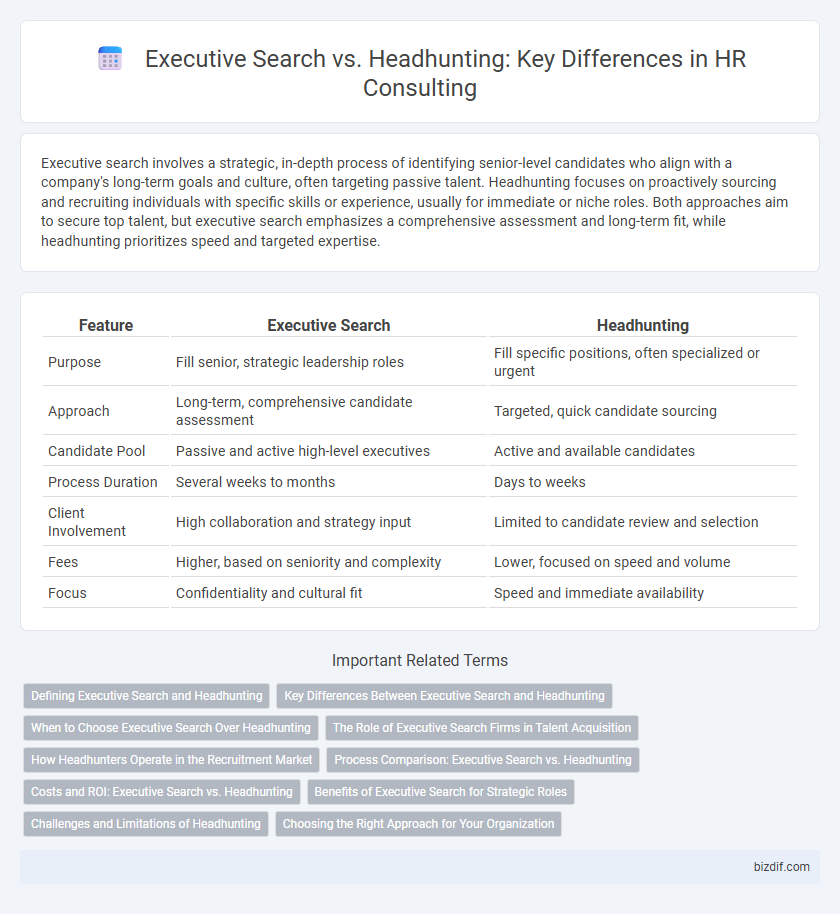Executive search involves a strategic, in-depth process of identifying senior-level candidates who align with a company's long-term goals and culture, often targeting passive talent. Headhunting focuses on proactively sourcing and recruiting individuals with specific skills or experience, usually for immediate or niche roles. Both approaches aim to secure top talent, but executive search emphasizes a comprehensive assessment and long-term fit, while headhunting prioritizes speed and targeted expertise.
Table of Comparison
| Feature | Executive Search | Headhunting |
|---|---|---|
| Purpose | Fill senior, strategic leadership roles | Fill specific positions, often specialized or urgent |
| Approach | Long-term, comprehensive candidate assessment | Targeted, quick candidate sourcing |
| Candidate Pool | Passive and active high-level executives | Active and available candidates |
| Process Duration | Several weeks to months | Days to weeks |
| Client Involvement | High collaboration and strategy input | Limited to candidate review and selection |
| Fees | Higher, based on seniority and complexity | Lower, focused on speed and volume |
| Focus | Confidentiality and cultural fit | Speed and immediate availability |
Defining Executive Search and Headhunting
Executive Search is a strategic recruitment process focused on identifying and attracting top-level executives for critical leadership roles within organizations, often involving in-depth market research and candidate assessment. Headhunting specifically targets individuals with specialized skills or experience, frequently leveraging personal networks to approach passive candidates who are not actively seeking new positions. Both approaches aim to secure high-caliber talent but differ in scope and methodology, with Executive Search offering a broader, comprehensive talent acquisition strategy.
Key Differences Between Executive Search and Headhunting
Executive search involves a comprehensive, strategy-driven process targeting high-level leadership roles, emphasizing confidentiality and deep market research. Headhunting typically focuses on filling mid-to-senior positions more quickly by directly approaching candidates, often based on existing networks. Key differences include search scope, candidate engagement methods, and the level of customization in aligning talent with organizational culture and long-term goals.
When to Choose Executive Search Over Headhunting
Executive Search is ideal when filling senior-level or specialized roles that require a thorough candidate vetting process and discreet engagement. It involves a strategic, long-term approach with extensive market mapping, suitable for leadership positions impacting company direction. Headhunting focuses on immediate talent acquisition for specific skills but lacks the comprehensive analysis essential in Executive Search for core executive roles.
The Role of Executive Search Firms in Talent Acquisition
Executive search firms play a strategic role in talent acquisition by identifying and recruiting top-tier executives who align with a company's leadership needs and culture. Unlike traditional headhunting, executive search involves a comprehensive process including in-depth market research, candidate evaluation, and long-term relationship building. These firms leverage extensive networks and industry expertise to secure high-impact talent critical for organizational growth and competitive advantage.
How Headhunters Operate in the Recruitment Market
Headhunters operate by proactively identifying and targeting top talent typically not active in the job market, leveraging extensive networks and industry insights to match candidates with specialized roles. They use personalized outreach and confidential approaches to engage high-level professionals, ensuring a tailored recruitment process that aligns with clients' strategic goals. Unlike traditional executive search, headhunting emphasizes direct sourcing and discreet negotiations to secure elite candidates quickly and efficiently.
Process Comparison: Executive Search vs. Headhunting
Executive Search involves a comprehensive and strategic approach, targeting top-level executives through a detailed assessment of company needs and in-depth candidate profiling, often leveraging long-term partnership development. Headhunting focuses on quickly identifying and recruiting specialized professionals or passive candidates, emphasizing speed and discretion to fill niche or urgent roles. The Executive Search process typically includes rigorous market research, competency mapping, and cultural fit analysis, whereas Headhunting is more transactional with a direct and aggressive candidate outreach strategy.
Costs and ROI: Executive Search vs. Headhunting
Executive Search typically involves higher upfront costs due to its comprehensive vetting, market mapping, and targeted outreach for senior roles, ensuring a strategic fit and long-term value. Headhunting often incurs lower initial fees but may lead to higher turnover and replacement expenses if the cultural or skill alignment is suboptimal. Evaluating ROI, Executive Search delivers greater returns by reducing hiring risks and fostering leadership stability, while headhunting suits urgent placements with potentially variable cost-effectiveness.
Benefits of Executive Search for Strategic Roles
Executive Search offers a strategic advantage by targeting senior-level talent with specific expertise aligned to long-term organizational goals, ensuring cultural fit and leadership potential. This method leverages in-depth industry knowledge and extensive networks to identify candidates who drive innovation and sustainable growth. Its thorough approach reduces hiring risks and enhances succession planning for critical executive roles.
Challenges and Limitations of Headhunting
Headhunting faces challenges such as a limited talent pool, often restricting access to only passive candidates, which can slow the recruitment process. Confidentiality issues may arise, complicating client-candidate trust and successful placements. Furthermore, headhunting incurs high costs and demands deep industry expertise to accurately assess candidate fit and meet executive expectations.
Choosing the Right Approach for Your Organization
Executive search involves a structured, research-driven process to identify top-level executives who align with an organization's strategic goals, while headhunting targets individuals for specific, often niche roles. Choosing the right approach depends on the organization's needs, timeline, and the complexity of the position, with executive search providing a comprehensive assessment and broader candidate pool. Organizations seeking long-term cultural fit and strategic impact benefit from executive search, whereas headhunting excels in rapidly filling critical, highly specialized roles.
Executive Search vs Headhunting Infographic

 bizdif.com
bizdif.com